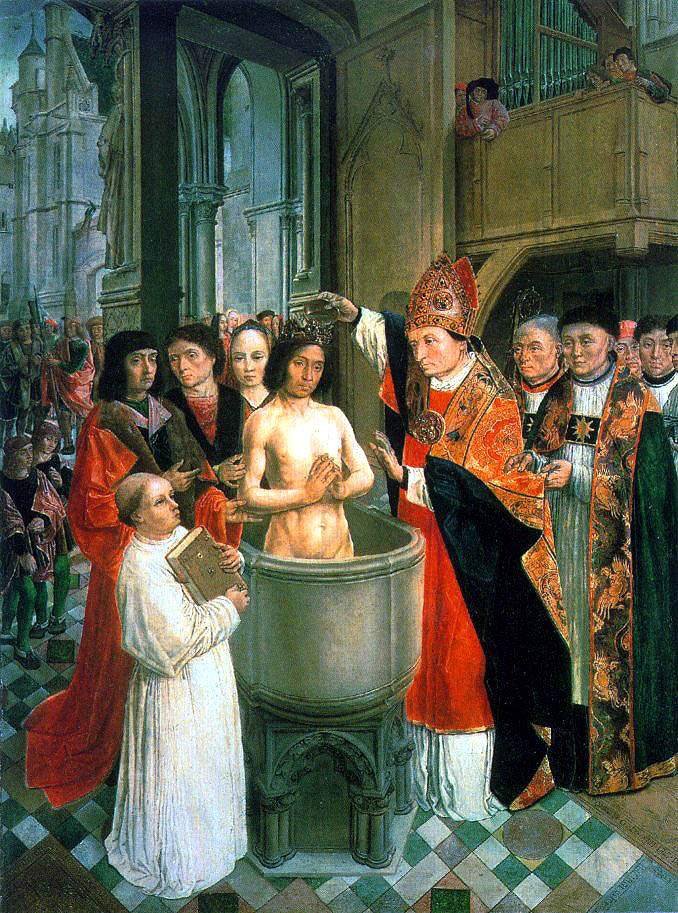I wrote a letter this morning to my former pastor at Calvary, asking him to attest to my baptism, which he gave to me in 1992 when I was twelve years old. The Catholic Church will recognize my Christian Baptism, made under the Trinitarian formula of “in the name of the Father, of the Son, and of the Holy Spirit,” as valid, and receive me as a candidate for Confirmation into the Church at Easter. But first I need witnesses. Thankfully, Pastor George is still pastor at Calvary, and my parents are still here and supportive.
Then I read this story on NPR, the other side of the coin: while I am working to have my baptism verified and recognized, an elderly man in France is fighting in court to have himself “de-baptized.” Is this even possible? Not in my understanding of the Sacraments. Not according to Rev. Robert Kaslyn, dean of the School of Canon Law at the Catholic University of America:
“One can’t be de-baptized. . . . [B]aptism changes one permanently before the church and God. One could refuse the grace offered by God, the grace offered by the sacrament, refuse to participate . . . but we would believe the individual has still been marked for God through the sacrament, and that individual at any point could return to the church.”
Baptism, in Catholic theology (CCC #1213-1284), is a new birth, a birth into a life of grace in the Church, a “washing of regeneration and renewal by the Holy Spirit.” But one can’t be un-born. Just as Nicodemus didn’t understand — “How can a man be born when he is old? Can he enter a second time into his mother’s womb and be born?” Nicodemus asked Jesus (John 3:4, ESV) — Rene LeBouvier wants to be un-born when he is old.
And it breaks my heart. I understand that the failings of some in the Church’s flock, among her shepherds even, have hurt many people, and offended many others. I understand that even as I am turning to the Church as something new and glorious, so many others are turning away from it as something antiquated and out of touch with “modern times.” I will write about these issues — the pedophilia scandals, the rejection of birth control and sexual protection even in AIDS-torn Africa, and other charges against the Church — in more detail another time. For now, let me say that I choose to join with Christ’s Church, for the love and grace of Christ embodied in it; I choose not to reject it for to the failings of some of the men who make up it.
Baptism is the initial rite of initiation into the Church. Once you are baptized, you are a member of the Church, engrafted into the body of Christ. I suppose that membership is what M. LeBouvier wants to revoke. But, spiritually speaking, it can’t be done. He was baptized into Christ. It has been done. Perfectum est. He can erase the physical, temporal record of the event; eradicate his name from the baptismal records of the Church; but he can no more un-baptize himself than he can un-birth himself. (Ironically, this court case is creating more of an uneradicable record of his baptism than anything of the Church’s that he could have stricken.)
But it does make me wonder — just in time to discuss the sacrament of Baptism tonight at RCIA — what happens on the spiritual plane when someone walks away from and rejects the grace of Christ. Certainly, the Catholic Church believes that you can fall from grace — that having participated in the sacraments, especially involuntarily as an infant, does not guarantee one’s salvation. Not even membership in the Church as an adult, frequent attendance, or participation in the Eucharist guarantees one’s salvation. The visible Church, the Vessel of Salvation, carries both the saved and the lost. Not participating in the Church, effectively abandoning ship, probably does get you overboard, detached, but as Fr. Kaslyn said, you are forever “marked,” forever welcome to come back.*
I do have to say, though, from my own experience in trying to verify my baptism, that striking whatever records there are of that event — particularly when it happened over seventy years ago — might make returning a little difficult.
* Addendum (9:28 p.m.): We had a very good discussion of this issue and this article tonight at RCIA — the best class we’ve had so far, I think. We are now in open waters, learning to be Catholic and not just about Catholics. I asked Father Joe about this question — whether it’s possible, through renouncing one’s baptism, through walking away, through “abandoning ship,” to truly leave the Church — if the initiation of baptism can truly be reversed. And I liked his answer. “You can leave the Church, but the Church will never leave you.” Like the prodigal son coming home, the Church will always welcome you with open arms. You can never make God stop loving you, or revoke his grace having been granted.

